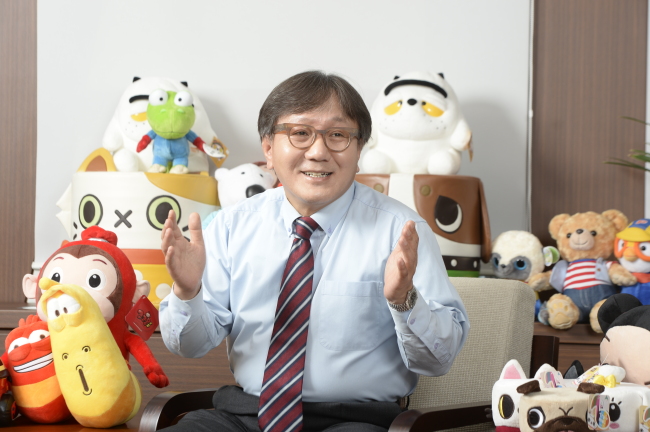[Herald Interview] Korea needs killer content beyond hallyu
State-run content agency eyes China, Indonesia for joint production
By 이우영Published : Aug. 13, 2015 - 18:00
Korean content, ranging from films and music to TV drama and fashion, is attracting more attention now globally than ever before, with Hollywood star Emma Stone saying she is “obsessed” with K-pop.
But Song Sung-gak, president and CEO of the Korea Creative Content Agency, said the domestic content industry has reached an inflection point, as the popularity of Korean content, referred to as the Korean Wave or hallyu, is showing signs of waning abroad, especially in its biggest market, Japan.
He said the industry needs to create more “killer content” and diversify its markets or export destinations via joint ventures and partnerships in order to sustain hallyu.
But Song Sung-gak, president and CEO of the Korea Creative Content Agency, said the domestic content industry has reached an inflection point, as the popularity of Korean content, referred to as the Korean Wave or hallyu, is showing signs of waning abroad, especially in its biggest market, Japan.
He said the industry needs to create more “killer content” and diversify its markets or export destinations via joint ventures and partnerships in order to sustain hallyu.

“The reason Korean content is losing its luster is that Korea has been unable to continuously create a series of hits that can set trends and issues overseas following Psy’s ‘Gangnam Style’ and TV drama ‘My Love from the Star,’” Song said in a written interview.
“We need to create killer content and diversify our markets.”
The KOCCA chief said the agency is seeking to further support small Korean content producers to make inroads into China and Indonesia by providing them a comprehensive service in financing and marketing.
The two countries show immense potential with China expected to become the world’s biggest content distribution market after the U.S. by 2016, growing about 11 percent on average per year. Indonesia, the world’s fourth-most-populous country with some 250 million people, can serve as a strategic market to access other Muslim countries, according to Song.
“Given that most of Korean content producers are small with insufficient capital, partnerships with China’s content producers will help and benefit Korea in producing content and overcome barriers to entering China,” he said.
He noted that Chinese producers adopting Korean variety TV show formats has proven to be successful in China, indicating that there is a lot of room for relations between the two sides to evolve and grow in the global entertainment sector.
“As for Indonesia, we analyzed the market and devised a strategy in the first half of this year,” he said.
“KOCCA and Korean producers will visit Jakarta, Indonesia, in October to introduce our content and seek cooperation from local producers.”
To ensure success and sustainability of Korean content production, KOCCA will create an environment in which producers can not only create killer content but also thrive overseas.
Its plan includes financially supporting the production of 100 items of content annually.
“The top priority, of course, is enabling producers to create excellent content,” said the KOCCA chief.
“To do that, we must do our part in creating an environment where they can grow.”
By Park Hyong-ki(hkp@heraldcorp.com)









![[Kim Seong-kon] Democracy and the future of South Korea](http://res.heraldm.com/phpwas/restmb_idxmake.php?idx=644&simg=/content/image/2024/04/16/20240416050802_0.jpg&u=)







![[KH Explains] Hyundai's full hybrid edge to pay off amid slow transition to pure EVs](http://res.heraldm.com/phpwas/restmb_idxmake.php?idx=652&simg=/content/image/2024/04/18/20240418050645_0.jpg&u=20240418181020)

![[Today’s K-pop] Zico drops snippet of collaboration with Jennie](http://res.heraldm.com/phpwas/restmb_idxmake.php?idx=642&simg=/content/image/2024/04/18/20240418050702_0.jpg&u=)